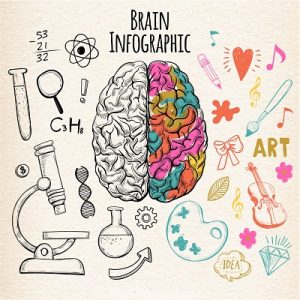 When we are children growing up, our imagination is the key to an untold world. In fact, kids with more active imaginations have better brain health, and more likely to dream and strive for greater things as adults.
When we are children growing up, our imagination is the key to an untold world. In fact, kids with more active imaginations have better brain health, and more likely to dream and strive for greater things as adults.
Too often, however, as we grow up, we are told to “get our heads out of the clouds” and that living in an imaginary world is not good for us.
However, stifling your imagination is the worst thing you could do for yourself, as it will only pave the way for accelerated aging, and a life that is left unfulfilled.
Not convinced of the utility imagination has for improving brain health?
Imagination Unleashes Creativity
Though many take creativity for granted, it is a trait not possessed by everyone. In fact, many people are classified as primarily “right brained” or “left brained” though if such a thing exists in reality is questionable.
Regardless, it is argued that highly intellectual, logical types are less likely to be creative, have less wild imaginations and are typically rule followers who do not believe in much of anything that cannot be logically concluded or attained.
Imagination unleashes creativity, allowing you to live a life filled with potential. The creative individual does not see the sky as the limit, instead the limit is as far as he or she can imagine.
They not only think outside the box, for them there is no box, and so their brains are constantly challenged, humming and conjuring up all sorts of goodies. Anything the mind can conjure is good enough to become true, be it work, life, personal goals accomplishments or anything. A very good trait to cultivate from childhood.
Having a More Active Imagination Boosts Empathy
Empathy is the act of being truly sympathetic to another person’s cause, without ever actually experiencing it yourself. Should it be a surprise to then hear that many people do not know how to express empathy?
The reason is simple; it is not because that person is a bad individual, or mean spirited. It simply means that individual cannot picture the grief of the person experiencing the situation, and thus cannot truly relate.
Your imagination may leave you well poised to offer a shoulder for support, as you are able to envision going through the same thing as the person suffering, and thus able to demonstrate what you think a person needs at that time. Being of service towards other people in that way, promotes your own mental health and emotional wellness.
Imagination Forges Stronger Neuronal Connections in the Brain
Those brain connections are what make you who you are, and forming new neuronal connections supports memory functions and keeps the brain vibrant, strong, and thriving.
Your imagination can be a useful tool for strengthening these connections, so that they become long-term memories. Here are two scenarios to explain how memory works; an intellectual will harness and strengthen memory by repetition. Studying work day after day enhances these connections bit by bit, or via physical practice.
On the other hand, someone who uses their imagination may know something well, and be able to recall all without every really doing it. Take for example planning for their wedding.
Years and years beforehand, that person could have meticulously planned and imagined their dream wedding, so that when the actual time comes, the planning step and what you want exactly pops up like clockwork. This can make imagination superior to theoretical learning.
Imagination Promotes Social Interaction
This is a major difference between creative and intellectual types, in that individuals with a more active imagination find it easier to relate and deal with people from all walks of life. This is likely where introverts and extroverts came into being from, as intellectuals are happy in their lonesome, with a good book or something to entertain themselves, while creatives seek for social interaction.
Social interaction is important later on in life, as forging of relationships in necessary for self-development and growth as an individual.
People with a more active imagination find it easier to relate and deal with people from all walks of life. Social interaction has been proven by scientific studies to reduce risks of dementia, and onset of age-related cognitive decline to keep the brain young, and thriving as you age.
The Alzheimer’s Association advises that leading an active social life protects against memory loss. Spending time with friends and family and engaging in stimulating conversation supports overall brain health and promotes mental wellness.
Being an intellectual should not be the yardstick measure for being smart, as your imagination offers a completely different perspective on life that makes it worth living. Children should not have their creativity stifled, as it may come back to bite them as an adult when they have difficulty with their social life.
Cultivate and promote your own imagination whenever possible, your brain is counting on you!






